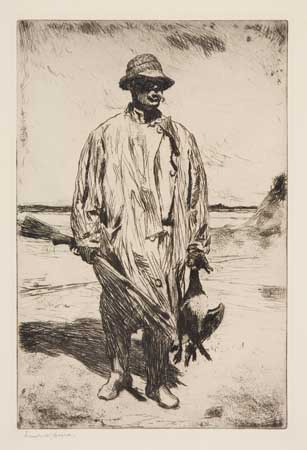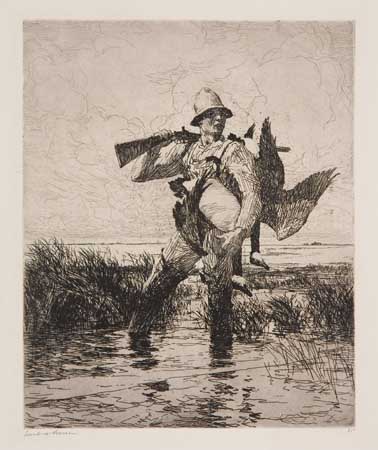Biography National Gallery of Art
Frank Weston Benson was a well-known and financially successful painter, printmaker, and teacher. A founding member of the Ten, Benson was associated with that group of painters who withdrew from the Society of American Artists in 1897 in order to promote their work through smaller, more personal exhibitions, the first of which took place in 1898. Though quite diverse in their approaches, much of their work was characterized by visible brushwork, a lightened palette, and a concern with the natural and evocative qualities of light.Benson was born in Salem, Massachusetts, in 1862, the second of six children of George Wiggin Benson, a prosperous Boston cotton merchant, and his wife, Elisabeth Frost Poole. His grandfather was Captain Samuel Benson, who sailed around the world and brought back many exotic treasures from his Far Eastern voyages, heirlooms that would appear later in his grandson's paintings. Benson's mother urged her husband to allow Frank to enroll in the newly-founded Boston Museum School in 1880, where he studed for three years under Otto Grundmann (1844-1890). While still a student, Benson began his career as an art teacher in the fall of 1881, hired by the city of Salem to teach evening drawing classes, which were offered free to the public.
Among his fellow students in Boston was Edmund C. Tarbell, who became Benson's lifelong friend and colleague for nearly three decades, as well as a fellow member of the Ten. The two young men studied together also in Paris, at the Academie Julian, under Gustave Boulanger (1824-1890) and Jules Joseph Lefebvre (1836-1911). While in Europe, where he arrived in October 1883, Benson spent the summer at the artists' colony of Concarneau, Brittany, and traveled with Tarbell through Germany, Italy, and England.
Upon returning to the United States in 1886, Benson worked briefly in Salem, Massachusetts, the town in which he would eventually settle. During 1886 and 1887 he taught drawing and painting at the Portland (Maine) Society of Art and in 1889 began to teach at the Boston Museum School. He remained there until 1912. While teaching Benson also received wide recognition for his own work. He won numerous awards, including the Hallgarten Prize at the National Academy of Design in 1889 and a Columbian Exposition Medal in Chicago in 1893. In 1896 he provided decorations for seven ceiling and wall panels in the Library of Congress. Benson became an Associate of the National Academy of Design in 1897 and an Academician in 1905. He was a founding member of the Guild of Boston Artists in 1914.
In 1915 the first exhibition of Frank Benson's etchings and drypoints was held. The prints, which were primarily of sporting subjects, such as waterfowl, combined Benson's great love of the outdoors with his free and open draftsmanship. So many variations of these subjects were created over the next decade that some accused the artist of being commercially repetitive. Nonetheless, the turn to sporting subjects in prints, watercolors, and paintings, changed the direction of his work and he created fewer of the serene paintings of women and children for which he had become so well-known. In the last years of his career his watercolor landscapes were much in demand.
Benson maintained his connection with the Boston Museum School as a member of the advisory Council until l930, when he resigned. Retrospective exhibitions of his work were held at the Corcoran Gallery, Washington, D.C., in 1921 and, jointly with Tarbell, in 1938 at the Museum of Fine Arts, Boston. Benson, who had a studio in Boston and, at various times, summer houses in Maine and Cape Cod, eventually retired to his home in Salem, Massachusetts. He died there on November 14, 1951.
Christie’s American Art on November 22, 2016
Christie’s May 18, 2011
Frank Weston Benson’s Eleanor and Benny (estimate:
$3-5 million), is an important example of the artist’s highly personal style of
American Impressionism. As a leader of the Boston School, Benson was one of the
first American artists to introduce figures into Impressionist landscapes,
creating a new style of painting that remains among the most beloved genres of
early 20th century American art. Painted in 1916, at the
height of Benson’s talents, Eleanor and Benny is a tender portrayal of
the artist’s daughter and grandson sharing the crisp summer light at the family
compound in Maine. With its refined subject matter and sensitive
execution, this superb, large-format painting brilliantly captures the aesthetic
of the Boston School and recalls in both subject and style the major
masterpieces of Benson’s early career. Offered from a distinguished private
collection, Eleanor and Benny was last exhibited publicly more than 15
years ago and has been requested for inclusion in a major museum exhibition in
2012.
Christie’s 2013
Frank Weston Benson
The Seamstress
800,000-1,200,000
Christie's 2012
Christie’s December 1, 2010
1,500,000- 2,500,000
Christie’s 2008
Christie’s 2002
More Christie's
Sotheby's 2013
Christie’s 2013
Frank Weston Benson
The Seamstress
800,000-1,200,000
Christie's 2012
Christie’s December 1, 2010
1,500,000- 2,500,000
Christie’s 2008
Christie’s 2006
Christie’s 2004
More Christie's
Twilight
PRICE REALIZED
$1,497,000
Girl on the Headland
PRICE REALIZED
$60,000
Portrait of Katherine Cavenaugh
PRICE REALIZED
$29,800
The duck hunter
PRICE REALIZED
$1,875
The deer hunter
PRICE REALIZED
FRANK WESTON BENSON
GROUSE AND SNOW
LOT SOLD. 35,000Sotheby's 2013
FRANK WESTON BENSON
1862 - 1951
1862 - 1951
AFTER SUNSET (LONG POINT SUNSET)
LOT SOLD. 389,000
Sotheby's 2011
FRANK WESTON BENSON
1862 - 1951
1862 - 1951
PORTRAIT OF MARJORIE COLDWELL WESTINGHOUSE (YOUNG GIRL IN A WHITE DRESS)
Estimate 250,000 — 350,000
Sotheby's 2008
FRANK WESTON BENSON
AMERICAN
GROUSE ON A PINE BOUGH
GROUSE ON A PINE BOUGH
Estimate
30,000 — 50,000
FRANK WESTON BENSON
AMERICAN
SHOVELLER DRAKE IN FLIGHT
SHOVELLER DRAKE IN FLIGHT
Estimate 30,000 — 50,000
Swann 2008
- FRANK W. BENSONOld TomEstimate $8,000 - $12,000Price Realized (with Buyer's Premium) $14,400
- FRANK W. BENSONMarsh GunnerEstimate $4,000 - $6,000Price Realized (with Buyer's Premium) $6,240
Skinner 2014
Sold for:
$2,091
Sold for:
$2,337
Sold for:
$1,230
Sold for:
$1,968
Sold for:
$1,968
Sold for:
$1,599
Sold for:
$1,107
National Gallery of Art, Washington, DC
- Benson, Frank Weston
- , American, 1862 - 1951
- Portrait in White
- 1889
- oil on canvas
- overall: 122.6 x 97.2 cm (48 1/4 x 38 1/4 in.)
- framed: 134.6 x 109.2 x 4.4 cm (53 x 43 x 1 3/4 in.)
- Gift of Sylvia Benson Lawson
- 1977.4.1
- Benson, Frank Weston (painter)
- , American, 1862 - 1951
- Margaret ("Gretchen") Strong
- c. 1909
- oil on canvas
- overall: 76.8 x 64.2 cm (30 1/4 x 25 1/4 in.)
- framed: 90.8 x 78.1 x 3.2 cm (35 3/4 x 30 3/4 x 1 1/4 in.)
- Gift of Elizabeth Clarke Hayes
- 1992.66.1
- On View
Menconi + Schoelkopf
Frank W. Benson
Lady in White (Helen Coffin Weld), 1897
Oil on canvas
40 x 32 inches
Signed and dated at lower right: Frank W. Benson 1897
A native of Salem, Massachusetts, Frank Benson was a key American Impressionist, winning wide popularity for style with his themes of sharply dressed women and outdoorsman leisure. Benson’s gifts of color and draftsmanship were evident at a young age, but his early and lasting commercial success was as much a product of Benson’s tireless dedication to his work.
He left for Paris in 1883, studying at the Académie Julian. There he polished his style and was certainly exposed to French Impressionism, but his first steps towards incorporating the still-stigmatized techniques of Impressionism were halting and tentative.
Some of his early successes back in the United States were described as Impressionist because of his focus on light and color, but it was not until the 1890s that he fully bloomed in that style. A member of the National Academy and the Society of American Artists, Benson joined with a number of artists (mainly from the Boston area) to break from the conservative ways of the Academy, in a group that was swiftly dubbed The Ten. While Benson himself was not prone to radical schisms, the much publicized break certainly solidified Benson’s relations with others of the group, including Edmund Tarbell, William Merritt Chase, and John Henry Twachtman. Whereas other members of the group had varying degrees of success, Benson enjoyed popularity and patronage, winning awards and critical acclaim throughout his career. His style was molded partly by his peers, with whom he often went hunting and fishing, but in critical acclaim he largely surpassed them.
The present work is exemplary of Benson’s sensitive portraits, lightly idealizing the sitter in front of an idyllic landscape backdrop. The painting was commissioned by Aaron Davis Weld to remember his recently deceased daughter. The treatment of the subject is not dissimilar to Benson’s painting of his future wife, Portrait in White, a picture that helped make the painter’s reputation. The sitter is treated with a solemnity appropriate to the memorial theme, but also features Benson’s characteristic attention to the semi-transparent layers of fabric. The artist completed as few as two nudes and perhaps only one classical theme in his otherwise prolific career. His attentions were squarely trained on the present rather than the ideal, and to a large degree his embrace of Impressionism was an attempt to make permanence of the fleeting, whether it be a blushing young woman or a duck in flight – perhaps one of the reasons Benson was approached for this sensitive commission.
Frank W. Benson
Winter Scene, 1934
Watercolor on paper
19 x 24 inches (sight)
Signed and dated at lower left: F W Benson / 34




































